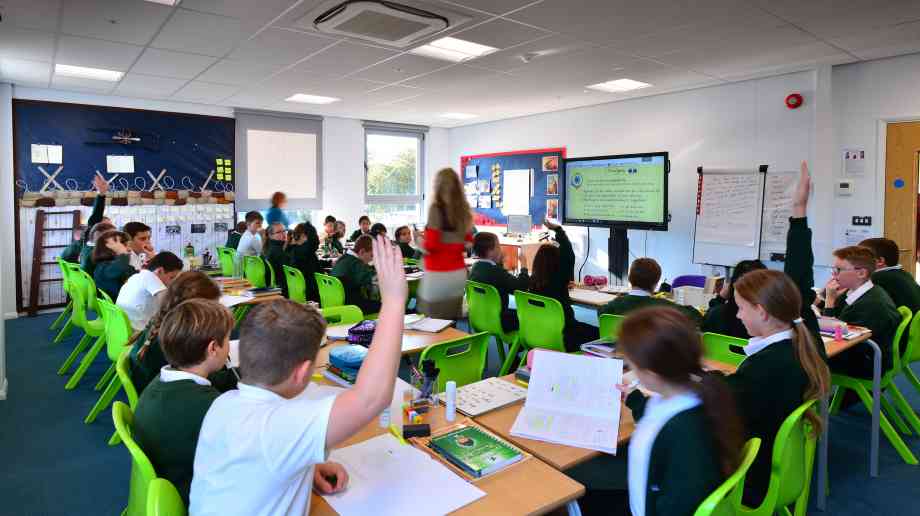
Modular technology in the rebuilding programme
The use of offsite modular technology will help deliver the government's ten-year school rebuilding programme, as well as meet the UK’s net-zero target, writes MPBA chief executive Jackie Maginnis
Schools across England are set for a transformative ten-year rebuilding programme under radical plans to be set out by the Prime Minister at the end of June 2020. Representing the first major school rebuilding programme to be launched since 2014, schools will benefit from substantial additional investment. The rebuilding programme will start in 2020-21 with the first 50 projects.
These new education projects will be greener, helping meet the government’s net-zero target, and will focus on modern construction methods – volumetric modular technology will play a major part in the delivery strategy.
This initiative comes on the back of the Department for Education’s (DfE) announcement in January 2020 revealing the offsite schools framework ‘to cultivate innovation and modernise the industry by increasing the adoption of Modern Methods of Construction.’ The DfE programme will deliver some 30 offsite schools a year with a projected pipeline of up to £3 billion over the next four years.
Investment will be targeted at school buildings in the worst condition across England – including substantial investment in the North and the Midlands – as part of the Prime Minister’s plan to level up opportunity for all.
Expertise in modular technology
As the construction industry starts to emerge from this pandemic, it’s important we lay the foundations for a more rapid and sustainable schools building programme, where the focus is on quality and delivering education facilities that are fit for the future. The use of offsite modular technology will help meet the government’s net-zero target.
We are pleased that some of our members have been appointed to bring their expertise in volumetric modular technology to the fore within the offsite schools framework, which will help to deliver high-quality education facilities as swiftly as possible.
Many are concerned about the impact Covid-19 will have on education, it is therefore even more crucially important that school building programmes get back on track as soon as possible to ensure teachers and students have the best possible environments as they make up for lost time.
School buildings are critically important. The physical and social environment in which schoolchildren and staff spend a high proportion of every weekday has profound effects on their physical, emotional and mental health as well as affecting their attainment. For most schools, however, creating new spaces is not a straightforward task - there will be many practical and financial constraints to consider.
The major headaches for headteachers and governors include serious disruption such as, noise, dust, changes to access, security, caused by a traditional construction project and managing the Health and Safety of the staff and children during the construction period. There are already complex challenges around operating school sites securely and cost-effectively, to deliver a safe and suitable environment for pupils, staff, and community users.
Although many think volumetric modular construction is a new thing – numerous companies have remarkable histories, in some cases between 55 to 80 plus years, in providing the highest-quality modular buildings – from temporary classrooms to multi-storey teaching blocks complete with offices, catering facilities and welfare accommodation.
The modular industry has had a remarkable impact on reducing build programmes whilst increasing quality and safety. Having gained considerable momentum over the past few years, advanced modular techniques reduce build times by an impressive 50-60%. The demand for customisation has led the industry to develop methods for adaptation during the mass production process to meet individual school’s requirements.
Benefits
The main benefits of these modern methods for the education sector include predictability of costs and timescales, faster delivery, and less disruption, noise and dust on-site. Other benefits include 90 per cent fewer vehicle movements, improved health and safety, consistent quality, and a major reduction in post-handover defects. Reduced environmental impact and enhanced Sustainability—lifecycle analysis, demonstrating 40 per cent reduction overall, are other benefits.
Offsite technology offers benefits that have had a huge positive impact on the construction industry, bringing longstanding traditional practices up to date. The first key shift away from traditional methods is that build processes take place in controlled factory conditions, which requires a change of mind-set and approach. These modules can be delivered to site pre-fitted with electrics, plumbing, heating, doors and windows, thereby reducing the onsite building programme and accelerating the overall construction process.
Aesthetics
More and more schools are switching on to the speed of factory manufactured buildings, but what about the aesthetic? The characterless demountables of the past have given way to digitally-led, modern designs, indistinguishable from traditionally constructed buildings.
Module selection is influenced by transportation dimensions and shipping distances. A number of other factors are also holistically considered to achieve optimal design efficiency. Module connection details and quantities, installation and crane rates, specific site logistics, all must be considered, together with foundations/transfer decks, volumes of required materials and other service core requirements.
As units are factory manufactured, stringent quality control processes can be undertaken within these well-managed environments. These in-house conditions also prevent weather from inhibiting the construction process, guaranteeing efficiency. In addition, modular construction enables site work and building processes to be completed simultaneously, reducing labour costs and build times.
Modular approaches are revolutionising the construction industry. Whilst traditional build processes are laced with pitfalls, hidden costs and are highly disruptive – volumetric modular buildings are easy to plan, budget, and are quick to install. Modular technology brings a host of benefits to the construction industry, contributing to healthier, safer and more cost-efficient environments.
Factory construction methods pose far fewer risks when compared with inherent dangers of a building site. The reduced onsite building time, coupled with the indoor manufacturing environment, combines to reduce the risk of accidents associated with construction sites. A recent report by CIBSE (Chartered Institute of Building Services Engineers) Journal has concluded the construction industry could reasonably expect a significant reduction in incidents if it adopted more of a manufacturing mindset.
With students becoming more conscious of climate change, introducing the concept of sustainable volumetric modular construction approaches will be beneficial. The modular way limits the amount of concrete, which is a significant issue for traditional builders. Eco-friendly materials are often specified and each individual component can be selected specifically for its performance characteristics, tailoring every inch of a modular build. There is also minimal waste, as the classrooms are built to exacting designed specifications and any offs-cut can be reused or recycled – reducing waste to landfill.
About MPBA
The MPBA plays a key role in the connecting of sectors in the modular and portable building industry. The association collaborates with specialist technical advisors to enhance innovation in the design and manufacture of modular buildings. These can be designed and manufactured from timber or steel in any size and shape to meet individual client needs while ensuring full compliance with building regulations. To discover how modular technology can benefit education construction plans go to: www.mpba.biz
Further Information:
Latest News
09/01/2026 - 10:13
The measure, added to the Children’s Wellbeing and Schools Bill, delivers on the commitment made in the government’s manifesto to bring multi academy trusts into the inspection system.
08/01/2026 - 10:30
The government is launching a new app allowing students to view their GCSE results on their phones for the first time from this summer.
08/01/2026 - 09:45
Education Business LIVE has announced that Professor Samantha Twiselton OBE of Sheffield Hallam University will speak at the event in March 2026, delivering two thought-provoking sessions focused on initial teacher training and SEND provision.
07/01/2026 - 10:10
Solve for Tomorrow is a free, curriculum-linked programme which is mapped to Gatsby Benchmarks 4, 5, and 6, helping teachers embed careers education without adding to workload.
06/01/2026 - 10:24
London's universal free school meals programme has not led to improvements in pupil attainment during its first year, but has eased financial pressure and reduced stress for families.







